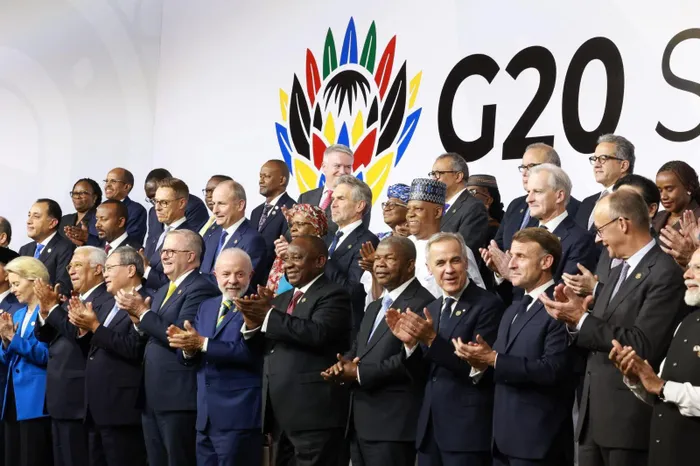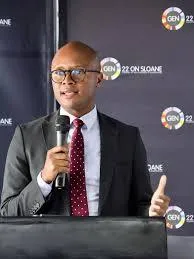
The G20 Summit on African soil proved a success, says the author.
Image: Supplied
South Africa has officially done the unthinkable: pulled off the first-ever G20 Summit on African soil, smoothly, stylishly, and with enough gravitas to make global leaders nod thoughtfully while sipping rooibos tea. Under the theme “Solidarity, Equality, Sustainability,” Africa didn’t just host the summit. It owned it.
And yes, while Donald Trump’s on-again, off-again relationship with attendance (“I’m coming. I’m not coming. Actually, where is South Africa again?”) gave international journalists enough drama to last the week, the real winners quietly stepped into the spotlight, the African MSMEs (Micro, Small, and Medium Enterprises). Besides the political ping-pong caused by the US, the summit ended on a high note.
The G20 declaration noted that never-ending wars, terrorism threats, and ongoing attacks on civilians are the real enemies of economic growth and prosperity. We applaud the G20 for condemning the whole blood menu that is served to African communities by war mongers. For MSMEs, this is excellent news as it results in fewer disruptions, meaning more time focusing on keeping the tills ringing instead of checking if the local junta power struggle has reached the business district. If the UN Charter gets taken seriously this time, small businesses may finally enjoy the one thing no money can buy, peace, long enough to finish a business plan without a gun on our heads instead.
We also note that floods, droughts, cyclones, and the occasional desert storms result in MSMEs operating in a survival mode also got attention. The G20 has committed to strengthening early warning systems and disaster response. The use of nature- based solutions and support for developing countries, MSMEs can at least hope for fewer surprise weather attacks that wash away the stock and money safe lockers. Early warning systems mean entrepreneurs will finally know whether to pack umbrellas or evacuation bags.
Africa’s debt elephant, which normally steps on the feet of small businesses, also got the attention of the leaders. The G20’s push for debt sustainability could trickle down into generous credit terms with a sprinkle of Ubuntu, and maybe even debt-for-climate swaps. Imagine a world where your loan balance drops because your business planted a few trees. Sounds far-fetched, but so did a G20 Summit in Africa until last week.
The bright and exciting news is that the continent might see a tripling of renewable energy and a doubling of energy efficiency by 2030. The G20 welcomes the Mission 300 platform, led by the World Bank Group and the African Development Bank, which aims to advance efforts to connect 300 million people to electricity in Africa by 2030.
This might sound like a dream today, but if this becomes reality, MSMEs might experience the unimaginable change where routers could stay on, POS machines that don’t restart mid-payment, and fridges that endure beyond Stage 2 load shedding.
When it comes to minerals, Africa says, ‘no more shipping rocks, only iPhones!’ The G20’s new critical minerals framework is basically a breakup letter to centuries-old extractive habits. It encourages beneficiation and local value addition, meaning African MSMEs can join the party. Imagine small businesses crafting battery components instead of watching raw cobalt sail away to Europe. The value chain might finally start in Africa and stay in Africa.
Again, the declaration emphasises MSMEs as engines of innovation and decent work. It is about time! Africa’s entrepreneurs have been doing heavy lifting with little applause. Now, with G20 reaffirmation, MSMEs might see more funding programmes, more incubators, and fewer bureaucratic indemnity forms written in small font.
To be honest, Africa is a beacon of hope when it comes to food security. There is plenty of land and full of potential. The G20 pledge of support for the Comprehensive African Agriculture Development Programme (CAADP) and African Continental Free Trade Area (AfCFTA) initiatives is welcomed. Meaning African farmers may finally access markets beyond their 30 km radius. The dream of “continent-wide customers” that the farmers have been hoping for decades.
By the look of things, partnership for Africa is on the horizon, and the multinationals should please form a peaceful and orderly line. With the new Africa Engagement Framework (AEF) 2025–2030, we hope that foreign investors will be flocking in like it’s Black Friday.
And you Nelson Mandela Bay in the land of King Ahlangene Sigcawu “Aa Vulikhaya!” are not the least. The G20 adopted the Nelson Mandela Bay Target to reduce youth unemployment and made a stronger commitment to gender parity. Female entrepreneurs and young hustlers, your time has come. You should expect more support, more mentorships, and fewer rooms where you’re the only woman or the youngest in the entrepreneurship boardrooms.
Finally, while Donald Trump spent days deciding whether attending an African summit would cause his supporters to spontaneously catch fire and run away from him, the continent did not run its mouth, but it moved on and moved forward. The G20 Summit on African soil proved a success, not because of who didn’t show up, but because Africa showed up for itself.

Bongani Ntombela, Executive: Programmes at 22 On Sloane.
Image: Supplied
Bongani Ntombela, Executive: Programmes at 22 On Sloane.
*** The views expressed here do not necessarily represent those of Independent Media or IOL.
BUSINESS REPORT